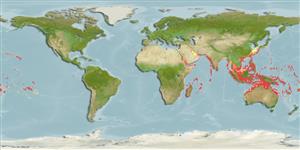分类 / Names
俗名 | 同种异名 | Catalog of Fishes(属, 种) | ITIS | CoL | WoRMS | Cloffa
Teleostei >
Eupercaria/misc (Various families in series Eupercaria) >
Lethrinidae (Emperors or scavengers) > Monotaxinae
Etymology: Monotaxis: Greek, monos = one + Greek, taxis = disposition (Ref. 45335).
More on author: Forsskål.
Environment: milieu / climate zone / depth range / distribution range
生态学
海洋 礁区鱼类; 非迁移的; 深度上下限 0 - 100 m (Ref. 9710), usually 5 - 30 m (Ref. 9775). 热带; 35°N - 30°S, 32°E - 122°W
Indo-Pacific: Red Sea and East Africa to the Hawaiian Islands and southeastern Oceania, north to Japan, south to Australia.
印度-太平洋: 红海而且东非到夏威夷群岛与大洋洲东南方,北至日本, 南至澳洲。
Length at first maturity / 大小 / 重量 / 年龄
Maturity: Lm 27.5, range 18 - ? cm
Max length : 60.0 cm TL 雄鱼/尚未辨别雌雄; (Ref. 2295); common length : 40.0 cm TL 雄鱼/尚未辨别雌雄; (Ref. 2295); 最大体重: 5.9 kg (Ref. 40637)
背棘 (总数) : 10; 背的软条 (总数) : 10; 臀棘: 3; 臀鳍软条: 9. This species is distinguished by the following characters: body oblong, greatest body depth of adults about 2.2 in SL; head profile strongly convex in front of eye, the snout sloping steeply; eye large 2.7 (juveniles) to 3.8 (adults) in HL; inner surface of the pectoral fin base is densely scaled; pectoral rays usually 14; caudal fin forked with pointed tips; lateral line scales 44-47; scale rows above lateral line (to base of middle dorsal spines) 5, below (to origin of anal fin) 13.5; side of jaw with row of 5-7 molariform teeth. Color of adult silvery grey with narrow dark scale margins, lips yellowish, a large black blotch covering pectoral fin axil, quick to assume pattern of 4 broad, blackish bars on body, the pale interspaces covering 3-4 scale rows; juveniles with black bar through eye, body with 3 dark brown to blackish bars with the 2 posterior bars extending onto the dorsal fin, and each lobe of caudal fin with an orange band (Ref. 2295, 90102).
胸鳍基底的内面覆满鳞片。 身体通常蓝灰色渐层色到微白色的在腹的部份上; 唇是黄色到略带桃色的。 那环绕着眼的区域时常黄色或橘色的。 没有特殊的斑纹,鳍通常。 薄膜是清澈或暗色的但是时常淡红的到橘黄色的。 上面胸鳍鳍条的基底与胸叶腋的内部基底 (也就是身体侧边) 是黑色的。 尾鳍通常与鳍的较灰白膜状部份成对比的黑色鳍条。 小的稚鱼 (时常也较大时 20-30个公分个体) 微白色的在下半部上而且有三条被在上半部上的比较狭窄白色的横带分开的突出的黑色鞍状斑。 一条垂直的黑色横带越过眼从上方。
Found in sand and rubble areas near coral reefs. Solitary fish are often encountered, but large adults usually form aggregations of up to about 50 individuals (Ref. 9710). Solitary or in groups (Ref. 90102). Benthopelagic (Ref. 58302). Nocturnal feeders (Ref. 9710). Feed mainly on gastropods, ophiuroids, and echinoids. Pagurids and brachyuran crabs, polychaetes, tunicates, and holothurians are consumed in lesser quantities. Caught mainly with gillnets, traps, spears, and handlines (Ref. 2295). Marketed fresh (Ref. 9775). Ciguatoxic in Marshall Is. (Ref. 171). Minimum depth reported taken from Ref. 128797.
发现于在珊瑚礁附近的沙子与碎石区了。 独居性的鱼时常被见到,但是大的成鱼通常形成鱼群达到大约 50个个体。 一个夜行的捕食者.(参考文献 9710) 主要吃腹足动物,阳燧足与海胆。 寄居蟹与十足目螃蟹,多毛类动物,被囊类与海参被少量食用。 在市场上销售生鲜地了。 (参考文献 9775) 在马绍尔群岛的有西加毒的.(参考文献 171)
印度-太平洋: 红海而且东非到夏威夷群岛与大洋洲东南方,北至日本, 南至澳洲。
Carpenter, K.E. and G.R. Allen, 1989. FAO Species Catalogue. Vol. 9. Emperor fishes and large-eye breams of the world (family Lethrinidae). An annotated and illustrated catalogue of lethrinid species known to date. FAO Fish. Synop. 125(9):118 p. Rome: FAO. (Ref. 2295)
人类利用
渔业: 商业性; 游钓鱼种: 是的; 水族馆: 商业性
工具
特别资料
下载 XML
网络资源
Estimates based on models
Preferred temperature (Ref.
123201): 24.6 - 29.1, mean 28 °C (based on 1440 cells).
Phylogenetic diversity index (Ref.
82804): PD
50 = 0.7500 [Uniqueness, from 0.5 = low to 2.0 = high].
Bayesian length-weight: a=0.02188 (0.01670 - 0.02866), b=2.95 (2.87 - 3.03), in cm total length, based on LWR estimates for this species (Ref.
93245).
营养阶层 (Ref.
69278): 3.4 ±0.0 se; based on diet studies.
回复力 (Ref.
120179): 中等的, 族群倍增时间最少 1.4 - 4.4年 (Preliminary K or Fecundity.).
Fishing Vulnerability (Ref.
59153): Moderate vulnerability (44 of 100).
Climate Vulnerability (Ref.
125649): Very high vulnerability (76 of 100).
Nutrients (Ref.
124155): Calcium = 13.8 [7.7, 30.8] mg/100g; Iron = 0.142 [0.080, 0.282] mg/100g; Protein = 19.5 [17.5, 21.4] %; Omega3 = 0.0686 [, ] g/100g; Selenium = 72.3 [36.9, 142.9] μg/100g; VitaminA = 56.8 [17.8, 158.9] μg/100g; Zinc = 0.438 [0.335, 0.630] mg/100g (wet weight); based on
nutrient studies.
